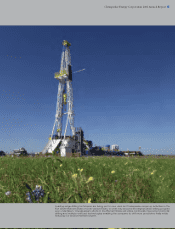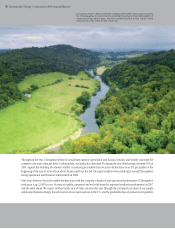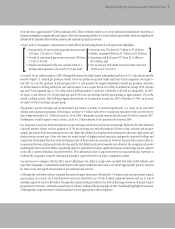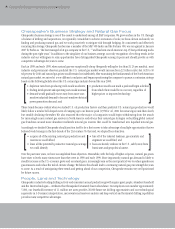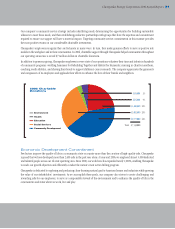Chesapeake Energy 2006 Annual Report Download - page 16
Download and view the complete annual report
Please find page 16 of the 2006 Chesapeake Energy annual report below. You can navigate through the pages in the report by either clicking on the pages listed below, or by using the keyword search tool below to find specific information within the annual report.
14
Chesapeake Energy Corporation 2006 Annual Report
Climate Change
Probably no public policy debate has evolved so dramatically in the past year as the debate about global climate change. A year
ago, it would have been difficult to anticipate the broad consensus that has emerged among the world’s scientists and policymakers
about the need to begin taking action to reduce the threat of global climate change. As a company employing dozens of earth
scientists (and two meteorologists), we are fully aware there have been many times in the past when the earth’s temperatures were
much higher than they are today, but with lower CO2 levels, and also many times when CO2 levels were much higher than they
are today, but with lower global temperatures. So to us, climate change over a long period of time is a normal and inevitable process
caused by an ever-changing planet.
However, even as we continue to learn more about the earth’s long history of climate change, it is difficult to ignore that humans
directly and indirectly consume energy, create heat and release carbon – a simple fact of everyday life. The debate is centered
around whether these human activities are the cause of the steady rise of greenhouse gas concentrations and worldwide temper-
atures during the past 20 years. Our view is that it is largely irrelevant whether or not the increases in greenhouse gas emissions
and global temperatures are natural or influenced by humans. The fact is we can, and should, reduce our greenhouse gas emissions
because the risks associated with failing to do so are simply too great.
This is where Chesapeake and natural gas can come to the rescue. As the debate in America intensifies about how to become more
energy independent in an increasingly dangerous world and at the same time reduce greenhouse gas emissions in a growing
economy, we need to frame the problem truthfully and solve it practically. The vast majority of greenhouse gas emissions are caused
by transportation vehicles burning gasoline and diesel and by power plants and factories burning coal. Today, we see policymakers
promoting alternative fuels such as wind, solar, biofuels and nuclear. These are all legitimate alternatives (although some much
less so than others), yet none can offer energy in great abundance at a reasonable price anytime soon. On the other hand, burning
natural gas instead of gasoline, diesel or coal reduces greenhouse gas emissions by approximately 50%. We believe the evidence
clearly demonstrates that natural gas is by far the most practical solution to the problem – it is abundant, affordable, reliable,
clean burning and domestically produced.
To spread the word about the positive attributes of natural gas, Chesapeake has recently helped establish a foundation based in
Washington, D.C., called the American Clean Skies Foundation (www.americancleanskies.com). This foundation will become a



